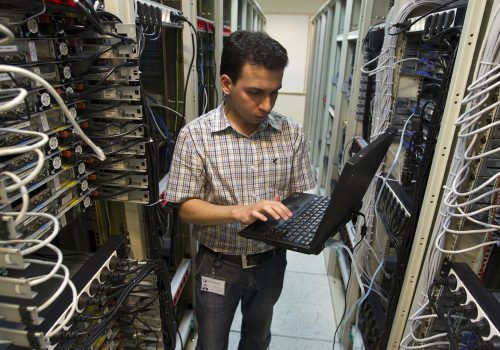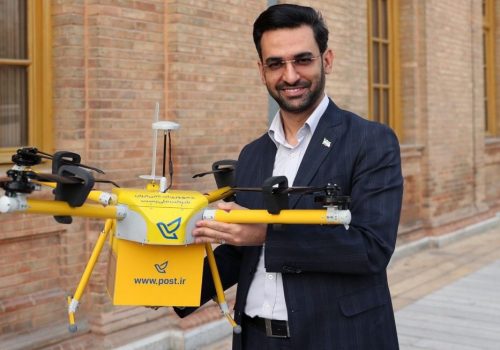February 7, 2020
Sanctions and domestic constraints cripple Iran’s startups
The Iranian startup ecosystem is deteriorating after a boomlet lasting from 2012 – 2016 as sanctions and domestic restrictions create new challenges and force businesses abroad.
The startup environment started to take a structured shape in Iran from 2012 – 2013 thanks to the initiatives taken by a number of universities, visionary individuals and the return of foreign-educated Iranians and the diaspora.
The movement was quite late compared with other developing countries such as India, but it quickly expanded and caught up with the latest technologies as more and more students, academics, entrepreneurs, government bodies, as well as domestic and foreign investors got involved. Several private, semi-private and governmental investment and venture capital firms, as well as angel groups, accelerators, incubators, and science parks, were established to drive and develop the ecosystem, which resulted in Iran rapidly becoming one of the fastest-growing startup environments in the Middle East.
Sanctions imposed on Iran until 2016 had created serious challenges for the country in many areas, playing a significant role in motivating investments in startups—from copying solutions that Iran did not have access to to inventing new ones. The startup communities formed and grew pretty fast supported by the country’s strong heritage of university programs developing highly skilled and tech-savvy engineers and scientists, covering e-commerce, aviation, automation and robotics, games, aerospace, communications technologies, social media, entertainment, utilities and smart cities, nano technologies, cloud computing, and fintech solutions among others.
The Iranian startup ecosystem, like any other entrepreneurial environment, has had its challenges over the years. However, during the past couple of years, especially since the US withdrawal from the Joint Comprehensive Plan of Action (JCPOA) in May 2018, the business environment for startups has deteriorated in several areas. The increasingly unsustainable environment is not only preventing the ecosystem from becoming a truly vibrant and growing one, but also impeding its paths to continue being an important job-creating industry.
Thus, there are several main obstacles for the Iranian startup ecosystem. First, investing in startups has the potential to yield significant returns, but it is not a risk-free enterprise. The domestic and foreign appetite for investments in Iranian technology startups has reduced substantially because of perceived high risks due to the country’s increasing political and financial challenges—domestically and internationally—since the US withdrawal from the JCPOA. Even with the most daring investors willing to take risks for long-term yields in Iran, the risks have become unreasonably high as political tensions have grown out of proportion in the eyes of investors. Domestic investors have preferred to wait or to engage in less politically sensitive investments, while the foreign investors are looking for opportunities elsewhere.
Similarly, in numerous statements and events during the current Iranian calendar year (beginning on March 20, 2019), various government-backed bodies including the National Development Fund (NDF) and National Innovation Fund (INIF), announced signing a so-called “Government-Backed Plans for Supporting Startups,” pointing at cumulative funds of up to $225 million, through which they are supposedly allocating loans and grants to existing and emerging technology startups. There are, however, three major problems here. The size of the allocated funds is too small to make a major difference considering the size of the Iranian startup ecosystem and the required initial investments. The other problem is that these funds are seldom fully deployed. The third and biggest problem is the practices of nepotism and corruption when allocating the loans and grants to applying startups.
Another obstacle is Iran’s internet access. Iran has advanced IT and telecommunications infrastructures providing fixed and mobile internet access to the vast majority of the population. Access to the internet is vital for the overwhelming majority of the businesses there. Restricting internet access by the Iranian government during recent protests not only severely hampered the startups’ operations, but also caused humongous financial losses to them bringing many to the edge of bankruptcy. Likely internet restrictions will from now on be considered a very serious operational and financial threat to the startups.
Yet another increasing challenge for the technology startups, especially those working with innovative software solutions, is the interruptive interference by the Iranian government’s security and regulatory bodies imposing security ambiguities and demands into the solutions—a “big brother” atmosphere rather than attempts to protect the users’ privacy.
An additional issue is that licensed access to many European and American hardware and software solutions has been severed as the result of tightening US sanctions since May 2018. Even Google and Apple have withdrawn parts of their services indefinitely for users in Iran. These restrictions take a serious toll on the technology startups as many of their products are running on European and American IT machines, platforms and applications.
As a result, Iranian startups—as long as they are based in Iran—will not have proper access, if any, to European and American products as well as services providers, the international market, or get exposure to international players in order to perhaps be acquired by them or to become their partners. Likewise, foreign companies—such as customers and suppliers—cannot buy or integrate Iranian startups’ products into their solutions out of the fear of violating US sanctions or wrongfully being accused of collaboration with the Iranian government even though they only cooperate with the startups within the private sector.
Considering these challenges, many Iranian technology startups are trying to move out of Iran. In line with their efforts, they have engaged with foreign investment firms as well as attended various startups events across Europe such as the Noah Conference, EU-Startup Summit, Slush and VivaTech in 2019 and recently Startup Day 2020 in order to find potential foreign business partners and investors.
The success of Iran’s startup ecosystem depends on the country’s political stability. Therefore, Iran’s brain drain will continue as many promising startups have already taken and will continue to take their ideas, products, and ambitions to places where they feel more appreciated and supported while working in more democratic and peaceful environments free from political and economic mayhem in addition to conservative revolutionary ideologies.
Mohsen Tavakol is an international business executive, a technology entrepreneur, and investor. He is also an advisor on sanctions, international trade compliance, and business ethics. Follow him on Twitter: @Mohsen_Tavakol.
Image: A startup in Tehran (Mohsen Tavakol)


